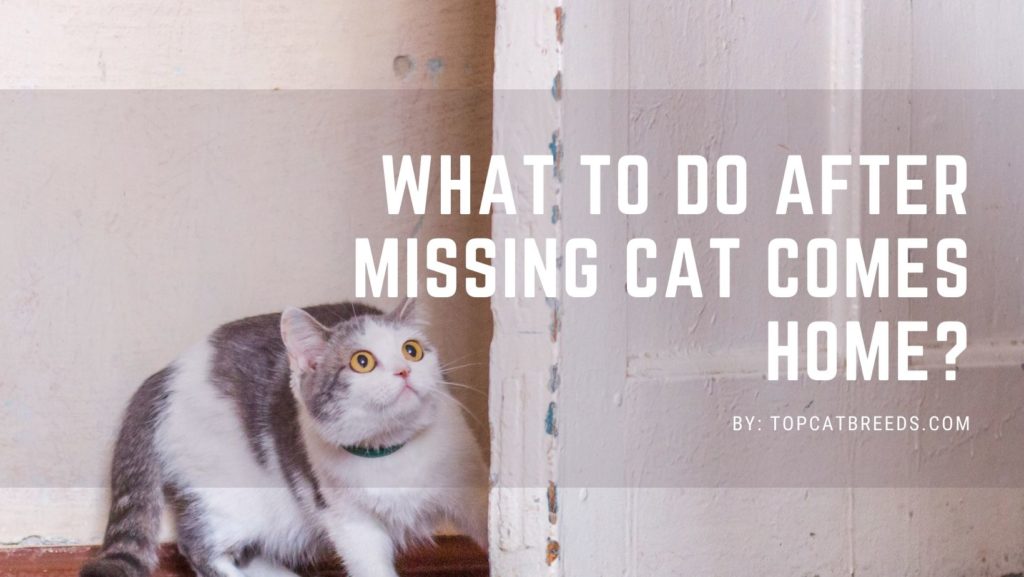It’s one of a pet owner’s biggest heartbreaks when their beloved cat goes missing. With “Lost Cat” posters and SNS posts everywhere, it’s understandable why you’d feel like celebrating once they go back.
However, tending a newly returned cat is not all fun. You need to know what to do when your lost cat returns home, so you can rest assured that your cat is fine and free from health-related risks. Doing certain tasks will also help you prevent the incident from happening again.
If you want to know more about this topic, then read on to the following sections.

How Will A Cat Behave After Being Lost?
A cat’s behavior after being lost is on a case-to-case basis.
Depending on their background and what they experienced while being lost, they may display new either positive or negative attitudes. Sometimes, you can even expect both.
Cats that often get lost, on the other hand, tend to have little to no changes in their habits. Unfortunately, indoor cats are more prone to negative changes since they’re used to only being at home.
One of the most common things that you may notice includes frequent hiding, trembling, and other anxiety-related signs. These usually happen when they experience a traumatic event or abuse while being lost.
Read also: What Can I Give My Cat To Calm Her Down? 8 Effective Solutions
On the positive side, cats also have a high tendency to be sweeter and more affectionate. Some happen to be clingier to their owners and the other people and animals that they’re comfortable with. This can be a sign of gratefulness or longing.
What To Do After Missing Cat Comes Home

To walk you through what to do when your lost cat returns home, below is a list that you can refer to:
1. Check Your Cat Personally For Issues
The first thing that you should do once you find that your cat has returned home is to check them personally for possible issues. It doesn’t matter if they have only been gone for half a day or as long as several months.
Simply touching and thoroughly looking through their body for wounds, external and internal injuries, and parasites will already be a big help in discerning their current condition. Doing so will also help you have an idea of where they have been and what they went through during the whole time that they were missing.
You should also try to figure out their mood. Are they scared, nonchalant, or anxious?
2. Bring Your Cat To The Vet
Even if you think there is nothing wrong with your cat based on your initial assessment, it will still be best if you can bring them to the vet. In this way, they can go through a more specialized set of tests and exams, which will indicate if your cat is suffering from internal or mental injuries.
Moreover, professionals can also give you a better overview of what you and your cat will be dealing with. While you’re at it, you should consider asking the doctor about things like what you should do, what to expect, and likes.
3. Give Your Cat Food And Water
The next thing that you can do is to give your cat food and water. You may also want to add in some of their favorite snacks to at least lighten your feline’s current mood. Do this either before or after you go to the vet. Opt for the former if it isn’t possible to take an urgent trip to the clinic.
If your cat doesn’t eat and instead stays silent, then you should check if they feel fine or not. If they seem weak, then you may have to look for ways to get urgent care. On the flip side, if it just seems like they’re not in the mood, then you can just observe them for a while.
Read also: 5 Best Calming Treats for Cats on a Budget
4. Give Your Cat A Bath
Since you don’t know where your cat wandered off to, then it’s highly recommended that you give them a bath. Doing so will get rid of the bacteria, germs, and dirt that have been staying in their bodies and fur.
You can also opt for a simple body wipe using wet wipes or a damp cloth if they’re not a big fan of water. If it’s possible, brush out their fur since it can help them relax better. This is a good alternative if you don’t want to stress your cat by submerging them in water.
5. Update Cat’s Collar And ID
One of the reasons why a cat can’t come home faster is if the people who see them don’t know if they have owners or how to contact them if so. That said, you should definitely take care and update their collars immediately. Add contact details like a number or an address.
Updating your lost pet listings should also be done. Focus on establishing your pet’s identity, so people will already know where to return your cat to if ever it happens again. Similarly, you can prevent your cat from being rehomed in a shelter.
Why Is My Cat Behaving Differently After Being Lost?
It’s actually normal for a cat to behave differently after being lost. They have been exposed to a new and potentially crucial environment, so you really have to expect the worst. This is most especially if it was your cat’s first time being lost or they have been out for too long.
Here are some other possible reasons behind your cat’s drastic personality change:
- Your cat experienced a traumatic event (e.g., animal abuse, catfight, loud noises, overwhelming events).
- They are trying to adjust to their old lifestyle.
- The feline adapted some new habits from the other animals it interacted with.
- Your cat is injured or is enduring any physical pain.
- The cat feels anxious or is still in survival mode.
Checking your cat for issues or taking them to the vet will definitely be a good starting step if you feel like your cat is expressing a number of adverse reactions and changes. You should also consider comforting them during the process.
What Percentage Of Lost Cats Come Home?
From a national study conducted by ASPCA in 2012, out of the 1,015 pet owners who lost their cats, 74% were successfully found. Only 49% of this portion referred to those missing felines who returned on their own.
In a more recent study made by Animals in 2018, about 66% of missing cats managed to come back home on their own. This is based on 1,210 cats from more than a thousand households.
The common point between the two studies involved the importance of taking external factors like the area, environmental factors, and the cat’s personality into account.
Final Thoughts
You shouldn’t wait for your cat to go missing before fully learning what to do when your lost cat returns home. It’s still helpful if you get a gist of these as prevention and preparation if things don’t exactly go your way.
To summarize, the first thing you should do is to check your cat for issues. It’s best if a professional check them in person for total assurance. You’ll also never go wrong by equipping your cat with location tracking tools like a microchip. A GPS-infused collar will also work if you’re not a fan of medical procedures.

